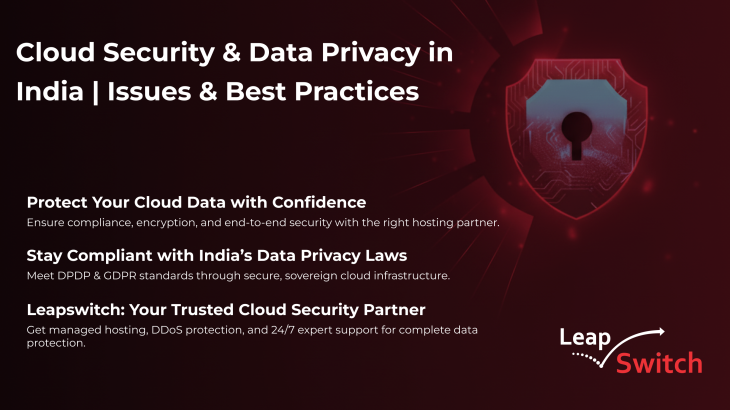In today’s digital era, cloud computing has become a no-brainer for many organizations. Its scalability, flexibility, and cost savings makes it an attractive option for hosting applications, storing data, and deploying services globally. However, shifting to cloud from on-premises infrastructure has its own challenges around data privacy & security, cloud security, and complying with regulations.
This article discusses the key data privacy and data security issues related to cloud computing and how secure cloud hosting can help in reducing risks.
Key Data Privacy & Security Risks
Shared Responsibility Model in Cloud Security
One of the first challenges is understanding that cloud security works in sync with a shared responsibility model. A shared responsibility model clearly states responsibilities for a customer and a cloud service provider. A cloud provider is responsible for securing infrastructure (physical security, virtualization, and network isolation), whereas the customer is responsible for securing the data, applications, identity access, and configuring those applications. Not clearly understanding the responsibilities often leads to data exposures, misconfigurations, or gaps in data protection.
Unauthorized Access and Data Breaches
Storing sensitive or personally identifiable data in the cloud can expose it to potential data breaches when compared to on-premises infrastructure. Attackers can exploit misconfigured APIs, insecure token or credential access, to obtain unauthorized data access. Once the data access is obtained, they may manipulate or delete the data altogether, leading to threats and vulnerabilities in the cloud environment.
Privileged Misuse
Many third-party integrations which help in compute resource provisioning in the cloud can have more access control to hardware, hypervisors, or network layers then its required. This privileged access can leak data when systems get compromised. Cloud providers should follow strict data transparency and clearly mention who has access and under what conditions.
Data, Sovereignty & Cross-Border Transfers with GDPR Compliance
Any data stored on the cloud is mostly replicated geographically across data centers around the world. The geography of where data lives typically complicates discussions around data privacy & security. Each jurisdiction has its own respective laws.
For example, under India’s Digital Personal Data Protection (DPDP) Act, 2023, if you want to transfer personal data out of India to other countries, it should be processed in compliance with Indian laws. Cross-border transfers of such data will be restricted to only those countries that the government seems permissible.
Lack of Visibility & Auditability
Organizations using on premises infrastructure usually have complete control of logs, audits and what is monitored as data warehouses are housed under their facilities. In the case of cloud environments, there can be various multi clouds or managed services, in which visibility over logs and audits may be lacking.
Errors & Misconfigurations
Many data privacy breaches in cloud environments result from human misconfiguration (open storage buckets, poorly written IAM policy, unsecured storage endpoints, inadequate default security settings, or lack of encryption).Its important to properly automate cloud security configurations and governance controls end to end.
Data Lifecycle & Residual Data
Data always moves, it’s copied, backed up, archived, and deleted and without appropriate policies in place, data can remain in snapshots, backups, or caches, leading to sensitive data exposure. A proper data lifecycle workflow should be in place in a cloud environment to handle deletion of data when it’s no longer required.
Compliance & Legal Risk
Organizations using cloud environments must be able to prove that data is handled securely within the organization’s and they are complying with data protection regulations. Failure to comply with regulations such as GDPR, CCPA, HIPAA can lead to severe fines, reputational damage, and potential litigation.
Secure Cloud Hosting: Choosing the Right Provider
When organizations seek out secure hosting options in the cloud, there are various factors that each organization needs to evaluate before choosing a cloud hosting provider.
- A cloud provider should offer strong encryption that is available while data is in transit and at rest. The data center should have both redundancy(maintaining multiple copies of data) and geographic diversity to help with fault tolerance and compliance.
- It’s important to take note of the geographical location of your data center, location/state of residency to maintain data sovereignty for cloud processing.
- A provider should have firewall and network isolation with DDoS protection while an access control model and Identity Access Management IAM should be configured with least-privilege access.
- Clearly understand how data is logged and monitored by the provider and what options the vendor provide in situations of backup and disaster recovery.
How Leapswitch Ensures Secure Cloud Hosting
Lets explore how Leapswitch matches the above expectations in terms of data encryption compliance, network architecture, support and transparency.
Leapswitch offers various hosting options in the cloud, VPS(Virtual Private Servers), and as dedicated servers. These servers come with redundancy built in to help meet data sovereignty requirements. The cloud servers leverage SSD and NVMe as standard for performance and reliability.
For backup and disaster recovery, Acronis Backups are provided depending upon plans, and customers can opt for managed and self-managed cloud hosting based on what responsibilities their organization can take care of in terms of infrastructure. For managed hosting, Leapswitch ensures support options are available 24 /7 and in cases where customers want to control data location. There are three server regions to choose from (US, Europe, and India).
Conclusion
Cloud Computing has its advantages: agility, cost savings, and scalability, but with that, it does bring complicated issues of data privacy & security, GDPR issues, and operational risk. The risk may come in various forms, a breach of data, misuse of data using insider access, compliance violations, or account misconfigurations.
Leapswitch can provide organizations with the benefits of secure cloud hosting, along with redundancy, DDoS protection, backups, and the infrastructure being compliance-ready. With the right cloud hosting partner, organizations can adopt cloud infrastructure with confidence, continue to innovate, while maintaining sensitive information security.
